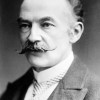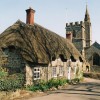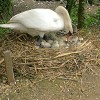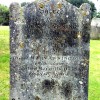For England the first half of the 17th century was a time of economic slump and religious dissension culminating in seven years of internecine warfare. Dorchester was one of the larger towns and situated at one of the busiest intersections in Dorset. Conversion from arable to pasture by enclosure was commonplace, forcing displaced agricultural workers to seek new employment in the towns. It was this bulge in the population of Dorchester that prompted some civic leaders of the day to call for overseas colonisation.
Against this background enter John White – The Reverend John White in fact, appointed Rector of the parish of Holy Trinity, Dorchester in 1606. He was mostly a moderate Puritan who conformed closely to the Anglican ceremonial and seems to all accounts to have been a charitable and civic-minded minister, attentive to the social conditions of his parishioners. But John White would earn for himself another claim to fame: as the cleric who led the organisation that would play a seminal role in the pilgrim settlement of New England during the first three decades of the 17th century.
John White was born in 1575 at Stanton St. John near Oxford, in the manor house opposite its 13th century church, nephew of Thomas White, Warden of New College, Oxford. Thomas also owned the manor, and it is believed he used his influence to lease the Manor Farm to his brother, John’s father. At first John White was educated at Winchester, he entered New College Oxford, where he resided for the next eleven years as a fellow.
At 31 White became Rector of Holy Trinity and was soon preoccupied in philanthropic activities aimed at improving the lot of the people of Dorchester. For example he persuaded civic officials to establish a free primary school. And following the serious fire that consumed much of the town in August 1613 merchants and councillors rallied around White in his campaign to raise subscriptions for its reconstruction. The fire had levelled his church, along with most public buildings, warehouses and about 170 homes. White’s fund received a £1,000 advance from King James towards the rebuilding work and job re-creation for the homeless and poor. Another free school, almshouses and workhouses were added in the following years.
Wrote Thomas Fuller: “All able poor were set to work and the important maintained by the profit of the public brew house, thus knowledge causes piety, piety breeding industry, procuring plenty into it. A beggar was not to be seen in the town.”
At that time there had been for a number of years a loosely organised band of fishermen carrying out fishing expeditions to the offshore waters of the New England seaboard. In 1623 however, a band of about 120 Dorset men founded Dorset Adventures (or Dorchester Company,) a joint-stock commercial angling organisation with John White as its pioneering leader. Many of the members were relatives of White; yet others were friends or ministerial associates.
Under White, members conceived a plan to set up year-round preparation and salting stations to process cod for English and overseas markets. In 1623 a group of Dorchester Company men sailed in The Fellowship to settle Cape Ann in Massachusetts, being supplemented by more men and supplies in 1624/25, after which the Dorchester Company was disbanded. Its property was then transferred to a new company, later to be known as the Massachusetts Bay Company, set up by John White in the former company’s place. The Dorchester Company had left White personally insolvent.
Two small ships bearing cargoes of provisions were dispatched to the new colony. The patent for the new company was obtained from the Council for New England on March 19th, 1628. On the 20th ships berthed at Weymouth were loaded with provisions ready to set sail for Salem, fulfilling White’s promise to Roger Contant, leader of the Salem settlers, that he would send more supplies.
By the end of 1630 White had become concerned about developments in the colony. The governor of the patent, a former Devon soldier called John Endicott, had sequestrated planter-settler’s gardens and homes for his own use and in the name of the Massachusetts Patentees. The earlier Dorchester planters were not happy with this; their rights as the first settlers had been assured through the influence and help of John White and special grants had been made to them. In 1629 White, with the help of John Humfry, had secured his title with the granting of a royal charter. By this time too, news of the plantation’s success had spread beyond the West Country to attract new settlers from among the London merchant class, clerics, and north and east countrymen.
Although his moderate Puritanism differed from that of the new company members, White was still a respected and intensely engaged member of the reformed company. In August 1629 he attended a meeting at which the company patent and government were transferred from London to New England. But the spiritual winds in New England were changing. White’s hope for a moderate Puritan plantation in Salem was denied by more radical elements in the company, chiefly represented by Endicott and separatist ministers. About this time John White composed “The Planters Plea.”
Then in March 1630 what would become known as the Winthrop Fleet, after the future Governor of Massachusetts John Winthrop, set sail for the colony. Meanwhile, White prepared his own ship, the Mary & Jane to sail with more planter-settlers from the West Country, many of whom were known or personally recruited by him. But frustration over the colony’s growing separatism compelled White to compose a tract called (by its shortened name) “The Humble Request.” The leaders of the Winthrop Fleet were asked to sign this tract in the hope – unrealised as it happened – that it would discourage them from adopting separatist policies once in the New World.
For some reason John White himself never joined the Great Migration. He maintained a watch over the colony’s affairs and lent assistance when needed, energetically mustering provisions for Massachusetts. This led, in 1631, to some people in Dorchester suspecting White of misappropriating parish funds towards the cause. In 1636 and 1637 he was moved to write to Governor Winthrop, taking him to task for not being more tolerant towards those with differing religious dispositions, and for allowing the merchants to over-profiteer. Then in 1633 White refused to comply with an edict from the Archbishop of England to have The Book of Sports read from the pulpit; instead he delivered an outspoken sermon that brought upon him suspicion of non-conformity. White even had his study searched for incriminating evidence. (Note: Book of Sports formally Declaration of Sports an order issued by King James I of England to resolve a conflict about Sunday amusements, between the Puritans and the gentry, many of whom were Roman Catholics.)
John White became a prominent member of the Westminster Assembly of Divines where, according to Anthony Wood, he was “one of the most learned and moderate among them … a person of great gravity and presence, and had always influence in the Puritanical Party near to and remote from him, who bore him more respect than they did to their diocesan.” Callendar, in his historical discourse about Rhode Island, called White “the father of the Massachusetts colony.”
When the Civil War broke out White sided with the Parliamentary cause, during which time his home and study were sacked by a detachment of Prince Rupert’s cavalry under the command of Prince Maurice.
The war over, he went into retirement at his rectory in Dorchester, where he wrote a tract called “The Way to the Tree of Life.” He died on 21st July 1648 aged 63 and was buried beneath the south porch of St. Peters Church in Dorchester.



